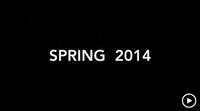Joseph Espinosa's Portfolio Homepage
Autobiographical Statement
A Search for Identity & Meaning
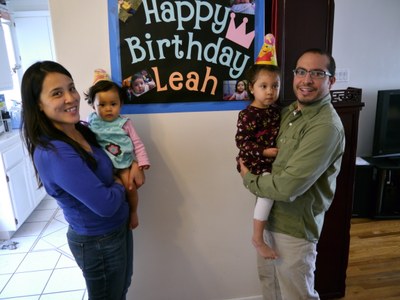 In looking for a church home during my freshman year at UCLA, and without a car in Los Angeles I called a church, the Dream Center, in Echo Park and asked if they could pick me up for their Saturday night service. To my surprise they said yes and I embarked on a bus ride that would change my linguistic life and help solidify part of my identity. It would also eventually in part change the path I had chosen for my career.
In looking for a church home during my freshman year at UCLA, and without a car in Los Angeles I called a church, the Dream Center, in Echo Park and asked if they could pick me up for their Saturday night service. To my surprise they said yes and I embarked on a bus ride that would change my linguistic life and help solidify part of my identity. It would also eventually in part change the path I had chosen for my career.
My early linguistic journey was born in the painful experiences my mother had growing up in Colorado. When she was nine years old she immigrated to the United States from Honduras with my grandmother, seven years after my grandfather, my namesake, died. They settled in the small town of Alamosa, Colorado, where my mother was enrolled in school. At her elementary school the other kids consistently teased her for not speaking English. She eventually learned to speak flawless English, but the damage was done and she determined not to teach her children Spanish, which was made easier because my father only spoke English. Thus we were a monolingual family, despite a rich linguistic heritage that included Spanish, and also Navajo and Apache on my father’s side. Perhaps I would somehow be able to reclaim this part of who I was and in turn become an advocate in someway for those who refuse to let go of their primary language on the journey to becoming fluent in Standard English.
The white Bluebird bus pulled up to the curb at the Rieber Hall turnaround. 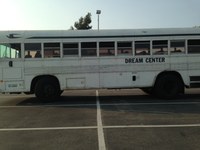 I boarded, noticing I was the only person on the bus. The bus headed east on busy Wilshire Boulevard toward downtown Los Angeles. Eventually we ended up in the Pico-Union and Echo Park areas and school-aged children and teenagers, all Latino, began to fill the bus. One 7-year-old Latina girl began to talk to me in Spanish. I didn’t know what to say, as my Spanish was very limited. The conversation ended quickly. I fell silent, and we arrived at the church. After the church service I sat quietly on the bus for the long journey back to UCLA, reflecting on my encounter with that girl, my feelings of sorrow and shame, and my own identity as someone with the Spanish surname, Espinosa. That night I made a resolution to learn Spanish and before I graduated from UCLA I had taken four courses of Spanish and become semi-fluent. Though not aware at the time I believe this experience was the start of my own interest in becoming an educator in part because though we couldn’t communicate I still connected with that girl, especially in the economic sense and I was curious to know about her, her family, and her culture, a culture that is some ways was different than mine, but in others ways reminded me of my own family and my own childhood.
I boarded, noticing I was the only person on the bus. The bus headed east on busy Wilshire Boulevard toward downtown Los Angeles. Eventually we ended up in the Pico-Union and Echo Park areas and school-aged children and teenagers, all Latino, began to fill the bus. One 7-year-old Latina girl began to talk to me in Spanish. I didn’t know what to say, as my Spanish was very limited. The conversation ended quickly. I fell silent, and we arrived at the church. After the church service I sat quietly on the bus for the long journey back to UCLA, reflecting on my encounter with that girl, my feelings of sorrow and shame, and my own identity as someone with the Spanish surname, Espinosa. That night I made a resolution to learn Spanish and before I graduated from UCLA I had taken four courses of Spanish and become semi-fluent. Though not aware at the time I believe this experience was the start of my own interest in becoming an educator in part because though we couldn’t communicate I still connected with that girl, especially in the economic sense and I was curious to know about her, her family, and her culture, a culture that is some ways was different than mine, but in others ways reminded me of my own family and my own childhood.
After my sophomore year I chose to live in South Los Angeles near USC to learn more about the urban realities facing those who lived there as part of an urban internship with InterVarsity Christian Fellowship. I was part of a team of five who lived with other Christians who had chosen to live in South Los Angeles to get to know their neighbors and serve the community in practical ways. One of the practical ways this group of working professionals served the neighborhood was by setting up an after school-tutoring program. With our team of five college students that program became a four-week summer tutoring program in English Language Arts (ELA) and Math. I taught a small group of four first graders, all Latino and this first experience of teaching was powerful in that I was able to develop relationships with the children and see their love for learning. The next year, my junior year, I continued to tutor in the after school program the following year. That summer helped me discover an internal desire to have a positive impact in urban communities and I began to question my major in Electrical Engineering, even though I had just been accepted into the program at UCLA.
Over the course of the next three years I had two additional experiences, which provided more perspective and knowledge about myself about what I might do with my life. In the summer of 2000 I completed an Electrical Engineering internship with Agilent Technologies, which paid well and was a great experience. It also left me questioning once again whether becoming an Electrical Engineer was right for me. The next summer as part of another mission trip to India, I taught English for a period of three weeks to a group of Nepali children in Nagaland. The thought of teaching resurfaced as I experienced a sense of meaning through touching the lives of those I taught.
My last quarter at UCLA, I took my only education course, Education 190, which required a good amount of self-reflection. During those ten weeks, I kept a journal, took two personality assessments revealing my strengths were more suited to teaching, and reflected the experiences mentioned above. With a better understanding of who I was, I decided to become an elementary teacher instead of an electrical engineer.
My Journey as an Educator
 As a teacher, I could instill a love for math, science, and engineering in many elementary students in urban Los Angeles. Thus after graduating from UCLA with a bachelor’s degree in Electrical Engineering, the first in my family to do so, I began to take the steps needed to become an elementary teacher. I took the CBEST and became a substitute teacher in the Alhambra and San Gabriel school districts for the 2001-2002 school year. In the spring I tutored math at a tutoring agency in the San Gabriel Valley and applied for the TeachLA credential program at UCLA, an alternative credential program. I was accepted into the program and on August 13, 2002 I was hired to teach elementary students in an elementary school in South Los Angeles with Los Angeles Unified School District (LAUSD).
As a teacher, I could instill a love for math, science, and engineering in many elementary students in urban Los Angeles. Thus after graduating from UCLA with a bachelor’s degree in Electrical Engineering, the first in my family to do so, I began to take the steps needed to become an elementary teacher. I took the CBEST and became a substitute teacher in the Alhambra and San Gabriel school districts for the 2001-2002 school year. In the spring I tutored math at a tutoring agency in the San Gabriel Valley and applied for the TeachLA credential program at UCLA, an alternative credential program. I was accepted into the program and on August 13, 2002 I was hired to teach elementary students in an elementary school in South Los Angeles with Los Angeles Unified School District (LAUSD).
The TeachLA program, a two year program, provided me with a greater understanding of what social justice might look like in teaching in an urban context especially with respect to issues around race, language, and poverty. Moreover it impacted the kind of education program I provided in my classroom in that I was not content to just teach ELA, ELD, and math, and so I faithfully taught science and social studies as well. 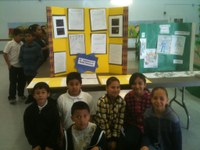 Early on I subscribed to the socio-cultural and constructivist theories of learning and so the workshop model of teaching, project based learning, and cooperative learning was the focus in classroom. For 9 years I sought to inspire students in teaching math, science, and engineering along with balanced literacy at two elementary schools, Hooper Avenue and Nevin Avenue, in South Los Angeles. I did this for 260 students over that time by passionately teaching inquiry based science and math, by taking on the roles of science and math lead teacher, and as a GATE coordinator, by starting an afterschool Engineering is Elementary program for fourth and fifth grade gifted and high achieving students.
Early on I subscribed to the socio-cultural and constructivist theories of learning and so the workshop model of teaching, project based learning, and cooperative learning was the focus in classroom. For 9 years I sought to inspire students in teaching math, science, and engineering along with balanced literacy at two elementary schools, Hooper Avenue and Nevin Avenue, in South Los Angeles. I did this for 260 students over that time by passionately teaching inquiry based science and math, by taking on the roles of science and math lead teacher, and as a GATE coordinator, by starting an afterschool Engineering is Elementary program for fourth and fifth grade gifted and high achieving students.
After the first semester of my 9th year I left to take a job as a Title III Instructional Coach in Boyle Heights at First Street Elementary. My experience in this role provided tremendous growth in working with English Language Learners (ELLs) and with adults. With regards to serving ELLs I had a good understanding of the academic difficulties in learning content and language at the same time, but my knowledge of their social and emotional needs grew substantially, especially after reading Tongue Tied: The Lives of Multicultural Children. In my role as instructional coach I sought to facilitate teachers meeting these needs through the professional learning design of Japanese style Lesson Study. In two years at First Street Elementary, I facilitated four lesson study cycles for grades 3-6 and in the process I grew in my capacity as aninstructional coach by facilitating group learning, through collaborating in planning a lesson, asking reflective open-ended questions, and as an instructional resource who can provide expertise and feedback based on observational data.
This experience was significant because in working with adults it is important to foster in individuals, but even more importantly in groups, a sense of self-determination, meaning, efficacy, and impact so they are empowered to continually improve in serving their diverse learners, including ELLs, with an ever present sensitivity to issues related to equity and access as they relate to equal educational opportunity.
While a Title III Instructional Coach I also had the amazing opportunity to be a part of making my dream of creating a STEM school in South Los Angeles come true. Of course this was important to me because I loved and passionately taught the STEM subjects as an upper grade teacher for 9 years in this same community. It was also the genesis of the idea of starting a STEM school, which I shared with an instructional director in my 7th year as a teacher. Two years later she called upon me to be a part of a writing team for a new K-5 elementary school with a STEM focus in South LA, which would open in the fall of 2012 as part of Public School Choice 3.0, the third round of school reform for LAUSD. Over the course of one year we wrote the plan of which I wrote in part or in whole the following sections including: instructional program, core curriculum, professional development, student assessment plan, and several of the waivers for autonomies in implementing the school plan. The plan was accepted without any required revisions and today the school is known as Sally Ride Elementary School. It is this accomplishment of which I’m most proud. Based on my experiences as a teacher and an instructional coach over the course of 11 years I feel that I have demonstrated a commitment to being a social justice educator and that now I am ready to meet my next goal of being a social justice school leader beginning with completing the Principal Leadership Institute at UCLA.
After two years as a Title III Instructional Coach, I accepted a position as a Common Core Math Facilitator, my current role, working under an instructional director in the Intensive Support and Innovation Center (ISIC) of LAUSD. Soon after taking on this new role I applied and was accepted to learn more about what it meant to be a social justice school leader as a Master’s candidate in UCLA’s Principal Leadership Institute. Through my learning in courses on leading in the urban context, education and the law, improving complex education systems, and curriculum and instruction through the lens of addressing the marginalization of different student groups, I’ve learned a lot about the importance of using systemic approaches in addressing this marginalization and had the opportunity as a Common Core Math Facilitator to share and apply my learning through professional development for principals and teachers, and through my various fieldwork projects.
Educational Service Center Context-Intensive Support & Innovation Center (ISIC)
Educational Service Center (ESC) Intensive Support and Innovation Center (ISIC) is an educational service center in Los Angeles Unified School District that serves 120 schools and 95,000 students over the entire 710 square mile geographical area of the district as a whole. It serves all the schools with the following school models including: pilot schools, Partnership for Los Angles Schools, and CORE Waiver schools. It is now in its third year of supporting these schools both through innovative approaches and intensive support regardless of school model.
ISIC’s approach to achieving positive results focuses on the instructional core, collaboration, investing the best thinking and resources into schools, and leveraging technology and community partnerships. Michael Fullan’s framework of right drivers of effective educational leadership including building capacity, developing group quality, focusing on instruction, and integrating systemic strategies informs the assistance provided to school site leaders. ISIC’s approach to implementing the Common Core State Standards in the classroom is informed by the Aspen Institute’s Implementation Guide as well as through a professional development service structure made up of Common Core Institutes at one of three Professional Development Centers. Moreover ISIC provides content area Menu of Services Professional Development Series with integrated implementation support and feedback, an innovate model inspired by the principles in the Center for Public Education’s report titled “Teaching the Teachers: Effective Professional Development in an Era of High Stakes Accountability” and in the NSDC’s Report “Professional Learning in the Learning Profession: A Status Report on Teacher Development in the United States and Abroad”.
In the 2014-2015 school year ISIC had 95,000 students enrolled students. Of those 81% are Latino, 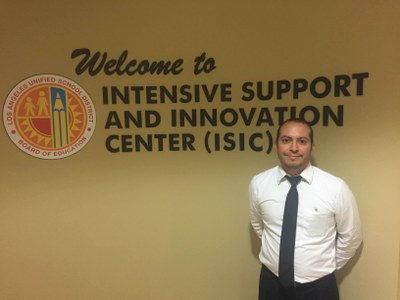 11% are African American, and 4% are Asian or Pacific Islander. Moreover in ISIC 73% of these students were eligible for free and reduced lunch during the 2014-2015 school year.
11% are African American, and 4% are Asian or Pacific Islander. Moreover in ISIC 73% of these students were eligible for free and reduced lunch during the 2014-2015 school year.
ISIC has innovated in other ways as well especially in how the work of improving schools is accomplished. For example ISIC uses an innovative team approach in which ISIC support teams comprised of instructional directors, operations coordinators, special education staff, parent and community coaches, and content experts work together to address the needs of schools. This work includes collectively identifying school-based needs, offering a high quality, relevant menu of services to school sites, and building the capacity of school teams on the school site to create effective systems of teaching and learning. Moreover ISIC is a learning organization with the believe that effectively implementing the Common Core State Standards requires establishing a “culture of adult learning”. This is accomplished in ISIC through support teams that provide assistance and opportunities for school Instructional Leadership Team members at school sites to facilitate adult learning that motivate educators and all partners who are critical to school improvement efforts. Topics of learning include effective feedback for teachers, intervention and enrichment, and establishing meeting structures and protocols that produce collaboration and build a welcoming and positive school culture and climate.

